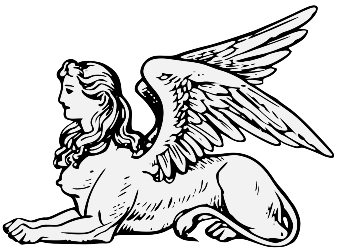
Deucalion and Pyrrah create humans
The flood myth is a mythological theme. It (usually) involves a divine flood sent to wipe out humanity. In most cases, a sole survivor and his family is chosen to repopulate the Earth. This theme is present in Greek mythology, Mesopotamian mythology, Aztec mythology, Hindu mythology and the Abrahamic religions of Judaism, Christianity and Islam.
In Myth[]
In Greek Myth[]
Deucalion and Pyrrha[]
The flood theme is present in Greek mythology. The gods send a flood to wipe humanity from the Earth, for accepting the gift of fire from Prometheus. However, Deucalion is warned by his father Prometheus. He, along with his cousin/wife Pyrrha, build a large ship until is runs aground at Delphi.
Having survived the deluge, they repopulate the Earth by creating men and women from rocks thrown over their shoulder, in accordance with a prophecy.
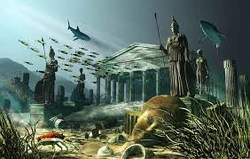
A representation of the suken city of Atlantis
In other traditions[]
The myth of Atlantis reflects the theme of a world-submerging flood. The city of Atlantis, reputedly full of sinful behavior, is sunk by Poseidon in the course of one night.
Similar accounts of a lost landmass or continent include the Indian Kumari Kandam and the lost continents of Mu/Lemuria. Many other landmasses have been submerged, such as the bridge over the Bering Sea (a land bridge allowing travel from Kamchatka to Alaska) and Doggerland (the connection between the modern British Isles and France).
In Mesopotamian Myth[]

Utnapishtim
Utnapishtim[]
The hero Gilgamesh, during his travels, meets Utnapishtim, the sole male survivor of a flood sent by the Mesopotamian deities. For surviving the flood, Utnapishtim and his wife are granted immortality. Their tale is similar to that of Noah.
Other[]
The Sumerian creation myth concerns primeval waters. In the beginning, the gods create people and animals and founded the first cities. Sometime later, the gods decide not to save the humans from a flood. The chief god does, however, warn Atruhasis and tells him to build an ark. The humans then make a sacrifice to the gods and are rewarded with a place in Dilmun.
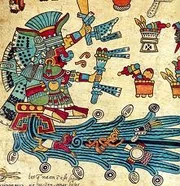
Chalchiuhtlicue
In Aztec Myth[]
The Fourth Sun[]
The fourth of the Five Suns in Aztec myth, was Chalchiuhtlicue. Though she was kindly, Tezcatlipoca was not, earning her his ire. He told her she only faked kindness to the people. This upset her and made her cry blood for 52 years. This drowned the humans on Earth, none of whom survived. However, Quetzalcoatl stole the bones of the dead from the god Mictlantecuhtli and resurrected the humans.
In Hindu Myth[]
Manu[]
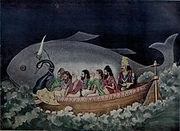
Matsya pulls Manu and the Saptarishi
A flood was sent by the gods to wipe out the humans. However, Vishnu, took the form of Matsya, a fish, to warn Manu and the Seven sages. He put them into a boat and pulled it to safety. The eight of them, with their families, survived the flood and repopulated the Earth.
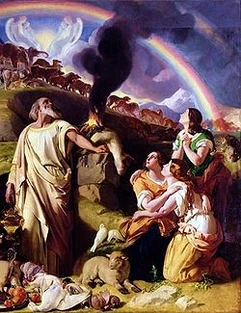
Noah
In Religion[]
In the Abrahamic religions of Judaism, Christianity and Islam, God (YHWH or Allah) sent a flood to wipe out the sinners of the Earth. However, he sent warning to Noah (Nuh) to build an ark. Noah, along with his sons Shem, Ham and Japheth, built and ark to accommodate both themselves and a male-female set of every species on Earth. After 40 days, the ark landed on (traditionally) Mount Ararat. Noah then made a sacrifice to God and, to represent the covenant he made with Noah (that he would not flood the Earth again), a rainbow appears after every shower of rain.
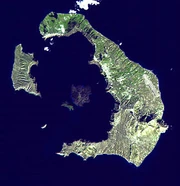
The remnants of Thera, now Santorini
Historical Hypothesis[]
Various historical settings have been proposed for a real occurrence of a large flood.
The Sumerian (Mesopotamian) cities of Ur, Uruk, Lagash, Nineveh and Kish show evidence of flooding. It is also believed the shape of Mesopotamia was greatly affected by the the filling out of the Persian Gulf after the last major ice age.
The ancient Greeks Egyptians and Romans all documented the discovery of fish fossils at the top of mountains, and used this as evidence to justify a worldwide deluge, concluding the world had been submerged multiple times throughout history.
Regarding the Deucalion myth, speculation that it was inspired by a large tsunami (that also triggered the eruption and subsequent sinking of the island of Thera, in turn inspiring the tale of Atlantis),
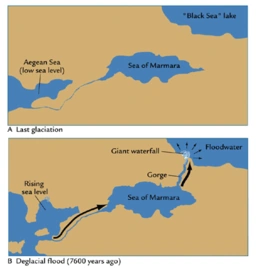
Black Sea Deluge
Another hypothesis concerns the flooding of the Black Sea and its merging (temporarily) with the Mediterranean.
Related Myths[]
Some related myths concern large bodies of water that eventually recede, forming land. This is particularly clear in creation stories.
In Egyptian Myth[]
Benben[]
In one Egyptian creation myth, Atum, the first god, is created sitting on Benben, a mound above the primeval waters of Nun. Out of spit or air, he creates Shu and Tefnut, who procreate themselves and help their "father" create the universe. Nut and Geb are born to Shu and Tefnut. Geb becomes the Earth, and Nut the sky. Their own children include Isis, Set and Nephthys. However, Shu, the air, is forced to hold up his two children to preserve the universe.
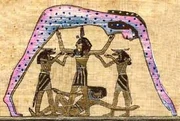
Shu hold up his daughter
Ogdoad[]
Another creation myth concerns the Ogdoad; a group of eight deities (four snakes and four frogs). These animals are water related and, as creation deities, symbolize a connection to the primordial oceans.
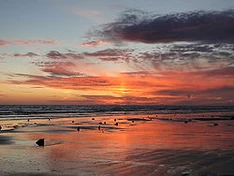
A submerged forest, related to Cantre'r Gwaleod
In Celtic Myth[]
There are many tales of sunken cities and kingdoms
Cantre'r Gwaelod[]
Cantre'r Gwaelod was a mythical Welsh realm (near Cardigan Bay), that was submerged into water. The two princes of the mythical kingdom were in charge of the dyke that kept out the seawater. However, one was a drunkard and, through his negligence, the sea flooded in and swept the land away.
Ys[]
The city of Ys was a mythical Breton city. Located off the coast of Brittany, the city was built under sea level by King Gradion at the request of Dahut, his daughter. A dyke protected the city. A single key that opened the dyke was held by the king.
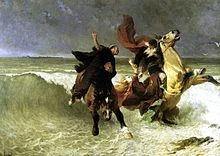
Gradion flees Ys
Ys was the most beautiful and impressive city in Europe, but quickly became a city of sin under the influence of Dahut. She organized orgies and had the habit of killing her lovers when morning broke. Saint Winwaloe decried the corruption of Ys and warned of God's wrath and punishment, but was ignored by Dahut and the populace. One day, a knight dressed in red came to Ys. Dahut asked him to come with her, and one night, he agreed. A storm broke out in the middle of the night and the waves could be heard smashing against the gate and the bronze walls. Dahut said to the knight: "Let the storm rage. The gates of the city are strong, and it is King Gradion, my father, who owns the only key, attached to his neck." The knight replied: "Your father the king sleeps. You can now easily take his key." Dahut stole the key from her father and gave it to the knight, who was none other than the devil. The devil, or, in another version of the story, a wine-besotted Dahut herself, then opened the gate.
The sea swept in and, though Gradion escaped, Dahut did not. The city bells were still heard in moments of calm.
